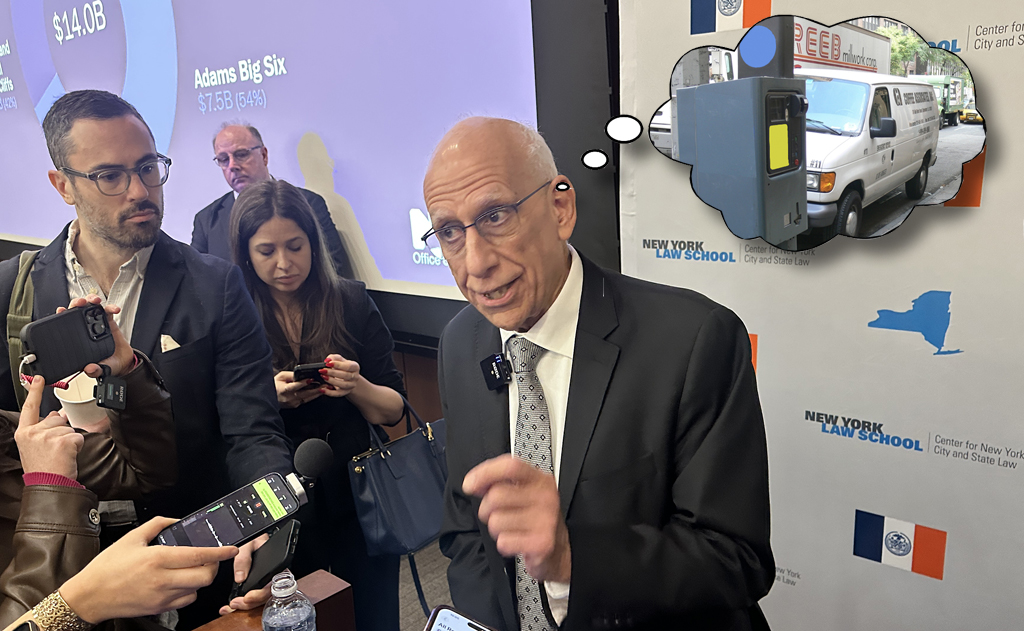Assembly Member Richard Brodsky, archenemy of Mayor Bloomberg's congestion pricing plan, is urging the mayor to seek a carbon tax instead. So he said, following Monday's meeting of the Traffic Congestion Mitigation Commission, as reported by Streetsblog and confirmed by at least one other observer.
 I wish Brodsky (pictured) had checked with me first. After all, if there's another New Yorker more obsessed with carbon taxing and congestion pricing than yours truly, I'll eat my bike helmet.
I wish Brodsky (pictured) had checked with me first. After all, if there's another New Yorker more obsessed with carbon taxing and congestion pricing than yours truly, I'll eat my bike helmet.
I co-founded the Carbon Tax Center last winter. Since then, I've spent hundreds of hours blogging, number-crunching and campaigning for the carbon tax cause. But my devotion actually began much earlier. Back when Barry Bonds was a svelte 180-pounder, before Dan Quayle wrote potatoe on a blackboard, I published a pro-carbon tax op-ed in the Washington Post (this was in 1989). And I've been banging the drum for congestion pricing in NYC for almost as long.
So I'd love to be able to say that a carbon tax is our ticket out of gridlocked streets. But it ain't so. When it comes to erasing New York's gridlock, a carbon tax would be about as effective as a mouse stomping on an elephant's toes.
But don't take my word for it. Go and input a carbon tax into the Balanced Transportation Analyzer ©, the spreadsheet model I'm creating for Ted Kheel's free-transit proposal. The results are underwhelming.
A carbon tax of $50/ton (of carbon dioxide) would cause a mere 8,000 auto trips a day into the Central Business District to disappear. That's just 1% of current traffic, and barely more than the increase in trips the MTA board just set in motion by raising bus and subway fares. And this is with a tax surpassing any carbon tax bill being considered in Congress.
By comparison, Mayor Bloomberg's proposed $8 daytime toll would eliminate an estimated 45,000 trips a day into the CBD. (The Kheel Plan, combining a $16 'round-the-clock cordon fee with free transit, would eliminate 250,000 daily CBD trips.)
A little math reveals why a carbon tax can't cure Gotham's gridlock: a tax of $50/ton of CO2 equates to 50 cents a gallon of gas, which is roughly the fuel burned on a typical round-trip drive into Midtown. Yet that same trip currently costs around $20 for gas, parking (where applicable) and tolls (ditto). Half-a-buck on top of twenty is way too little to make a big difference in travel choices. Moreover, part of drivers' response to higher gas prices from a carbon tax will be to trade up to more efficient cars without necessarily driving less. In contrast, an $8 cordon toll, or $16 for that matter, is real money, which CBD drivers can save only by reducing trips into the CBD.
Of course, Brodsky may just be feinting. He's a smart guy and may have deduced that his best shot at blocking congestion pricing is to sow confusion.
Or, Brodsky has decided that leading New Yorkers out of traffic hell isn't his concern. He'll attack the "right" to spew carbon without paying an emission fee, but he'll leave untrammeled the "right" to create traffic congestion without paying a congestion fee.
Ordinarily, anytime an elected official calls for taxing carbon, I'm thrilled. Not in this case. Even if Brodsky could deliver a statewide carbon tax tomorrow, New York would still be mired in motor vehicles. Just as a carbon tax is the antidote to too much carbon, charging a price to drive into Midtown is the antidote to too many cars.
Charles Komanoff will be discussing the Kheel Plan with Doug Henwood on WBAI-FM (99.5) this afternoon, beginning a few minutes after 5 p.m.





